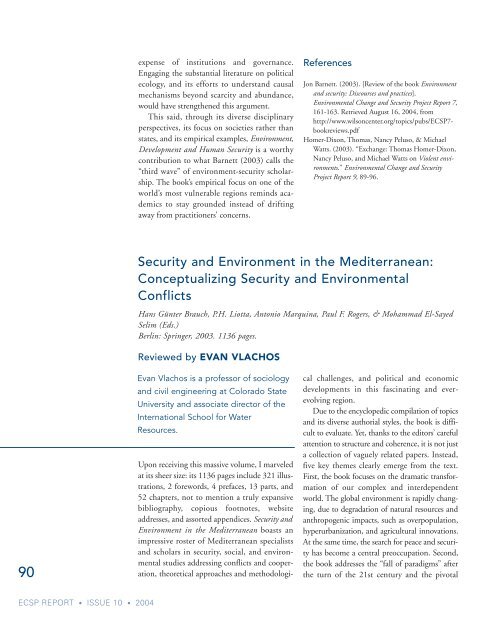Environmental Change and Security Project Report - Woodrow ...
Environmental Change and Security Project Report - Woodrow ...
Environmental Change and Security Project Report - Woodrow ...
Create successful ePaper yourself
Turn your PDF publications into a flip-book with our unique Google optimized e-Paper software.
expense of institutions <strong>and</strong> governance.<br />
Engaging the substantial literature on political<br />
ecology, <strong>and</strong> its efforts to underst<strong>and</strong> causal<br />
mechanisms beyond scarcity <strong>and</strong> abundance,<br />
would have strengthened this argument.<br />
This said, through its diverse disciplinary<br />
perspectives, its focus on societies rather than<br />
states, <strong>and</strong> its empirical examples, Environment,<br />
Development <strong>and</strong> Human <strong>Security</strong> is a worthy<br />
contribution to what Barnett (2003) calls the<br />
“third wave” of environment-security scholarship.<br />
The book’s empirical focus on one of the<br />
world’s most vulnerable regions reminds academics<br />
to stay grounded instead of drifting<br />
away from practitioners’ concerns.<br />
References<br />
Jon Barnett. (2003). [Review of the book Environment<br />
<strong>and</strong> security: Discourses <strong>and</strong> practices].<br />
<strong>Environmental</strong> <strong>Change</strong> <strong>and</strong> <strong>Security</strong> <strong>Project</strong> <strong>Report</strong> 7,<br />
161-163. Retrieved August 16, 2004, from<br />
http://www.wilsoncenter.org/topics/pubs/ECSP7-<br />
bookreviews.pdf<br />
Homer-Dixon, Thomas, Nancy Peluso, & Michael<br />
Watts. (2003). “Exchange: Thomas Homer-Dixon,<br />
Nancy Peluso, <strong>and</strong> Michael Watts on Violent environments.”<br />
<strong>Environmental</strong> <strong>Change</strong> <strong>and</strong> <strong>Security</strong><br />
<strong>Project</strong> <strong>Report</strong> 9, 89-96.<br />
<strong>Security</strong> <strong>and</strong> Environment in the Mediterranean:<br />
Conceptualizing <strong>Security</strong> <strong>and</strong> <strong>Environmental</strong><br />
Conflicts<br />
Hans Günter Brauch, P.H. Liotta, Antonio Marquina, Paul F. Rogers, & Mohammad El-Sayed<br />
Selim (Eds.)<br />
Berlin: Springer, 2003. 1136 pages.<br />
Reviewed by EVAN VLACHOS<br />
90<br />
Evan Vlachos is a professor of sociology<br />
<strong>and</strong> civil engineering at Colorado State<br />
University <strong>and</strong> associate director of the<br />
International School for Water<br />
Resources.<br />
Upon receiving this massive volume, I marveled<br />
at its sheer size: its 1136 pages include 321 illustrations,<br />
2 forewords, 4 prefaces, 13 parts, <strong>and</strong><br />
52 chapters, not to mention a truly expansive<br />
bibliography, copious footnotes, website<br />
addresses, <strong>and</strong> assorted appendices. <strong>Security</strong> <strong>and</strong><br />
Environment in the Mediterranean boasts an<br />
impressive roster of Mediterranean specialists<br />
<strong>and</strong> scholars in security, social, <strong>and</strong> environmental<br />
studies addressing conflicts <strong>and</strong> cooperation,<br />
theoretical approaches <strong>and</strong> methodological<br />
challenges, <strong>and</strong> political <strong>and</strong> economic<br />
developments in this fascinating <strong>and</strong> everevolving<br />
region.<br />
Due to the encyclopedic compilation of topics<br />
<strong>and</strong> its diverse authorial styles, the book is difficult<br />
to evaluate. Yet, thanks to the editors’ careful<br />
attention to structure <strong>and</strong> coherence, it is not just<br />
a collection of vaguely related papers. Instead,<br />
five key themes clearly emerge from the text.<br />
First, the book focuses on the dramatic transformation<br />
of our complex <strong>and</strong> interdependent<br />
world. The global environment is rapidly changing,<br />
due to degradation of natural resources <strong>and</strong><br />
anthropogenic impacts, such as overpopulation,<br />
hyperurbanization, <strong>and</strong> agricultural innovations.<br />
At the same time, the search for peace <strong>and</strong> security<br />
has become a central preoccupation. Second,<br />
the book addresses the “fall of paradigms” after<br />
the turn of the 21st century <strong>and</strong> the pivotal<br />
ECSP REPORT • ISSUE 10 • 2004

















